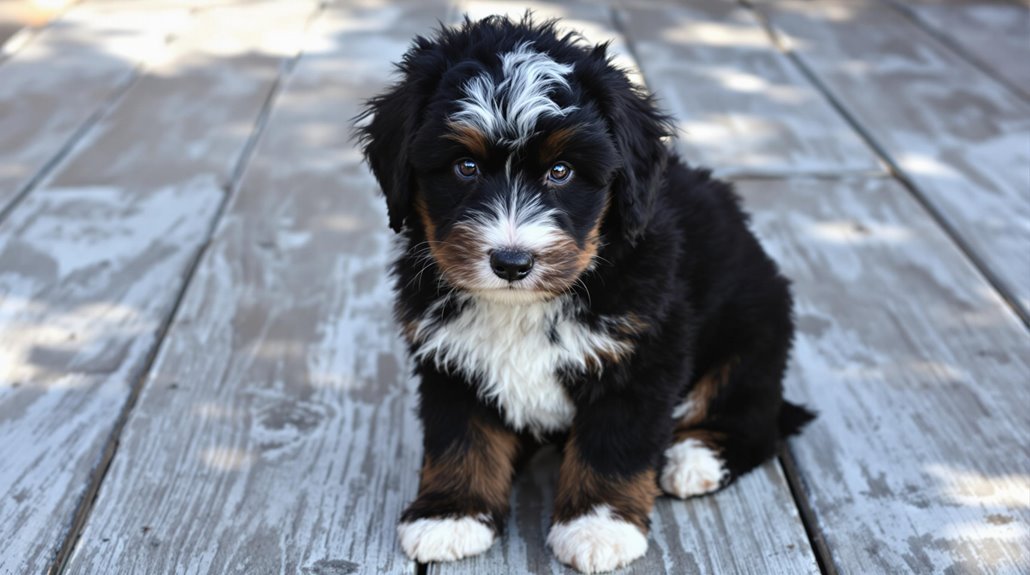The Bernedoodle combines the best traits of Bernese Mountain Dogs and Poodles, offering you a gentle, intelligent companion with a low-shedding coat. You'll find these dogs in three sizes: Tiny (10-24 lbs), Miniature (25-49 lbs), and Standard (70-90 lbs). First bred in 2003, they're known for their friendly temperament, making them excellent family pets. They require regular grooming every 6-8 weeks and 30-45 minutes of daily exercise. With a lifespan of 12-18 years and fewer genetic health issues than purebreds, they're a smart choice for allergy sufferers seeking a loyal, long-term companion. There's much more to discover about these remarkable designer dogs.
What Makes a Bernedoodle Special
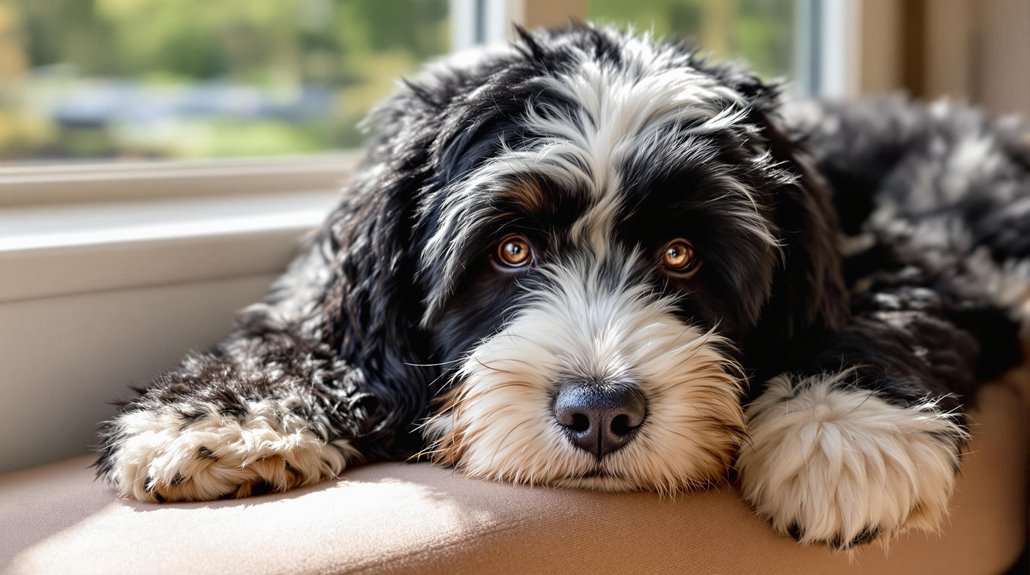
A delightful mix of brains and heart, Bernedoodles stand out as one of today's most sought-after designer breeds. Their loving temperament combines the best qualities of both parent breeds, creating a companion that's perfectly suited for families, therapy work, and devoted pet owners.
What truly sets Bernedoodles apart is their versatility and adaptability. You'll find these dogs available in three distinct sizes, making them an excellent choice whether you live in a cozy apartment or spacious home. Their intelligent nature, inherited from their Poodle parentage, makes training a rewarding experience, while their gentle disposition from the Bernese Mountain Dog side guarantees they'll be patient with children and other pets.
These remarkable dogs offer practical benefits that make them exceptional companions:
- Low-shedding coats that work well for allergy-sensitive households
- Extended lifespan of 12-18 years, longer than many pure breeds
- Exceptional emotional intelligence, making them natural therapy dogs
- Adaptable size options from 10 to 90 pounds
- Balanced personality that's both playful and calm
Their combination of intelligence, affection, and adaptability creates a unique package that serves both families and individuals seeking a devoted four-legged friend.
Origins and Breed Development
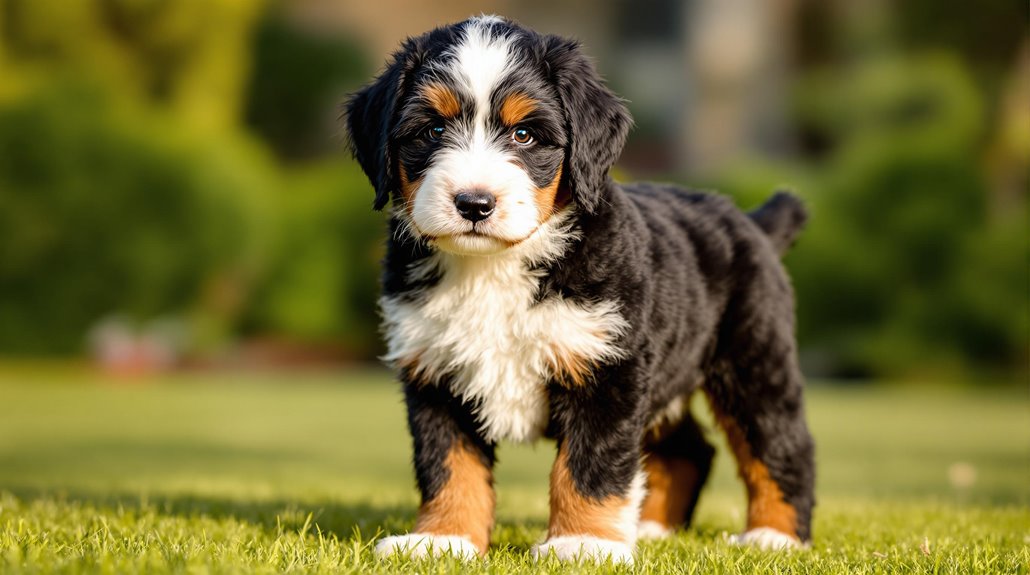
Pioneering breeder Sherry Rupke introduced the Bernedoodle to the world in 2003, creating this intentional crossbreed in Ontario, Canada. Her vision was to develop a companion dog that would combine the best traits of both parent breeds while addressing common health concerns.
The development of Bernedoodles focused on two main goals: creating a hypoallergenic family dog and improving upon the health challenges faced by purebred Bernese Mountain Dogs. By crossing Bernese Mountain Dogs with Poodles, Rupke successfully achieved both objectives. You'll find that these breed dogs typically enjoy longer lifespans of 12-18 years, compared to the shorter 7-year average of Bernese Mountain Dogs.
While you won't find Bernedoodles in AKC registries, several hybrid dog organizations recognize this thoughtfully developed crossbreed. The intentional breeding program emphasizes:
- Health improvement through hybrid vigor
- Intelligence from Poodle genetics
- Gentle temperament from Bernese Mountain Dogs
- Low-shedding coat characteristics
- Enhanced longevity compared to parent breeds
This careful breeding approach has resulted in a dog that maintains the beloved characteristics of both parent breeds while minimizing hereditary health issues.
Physical Characteristics and Sizes
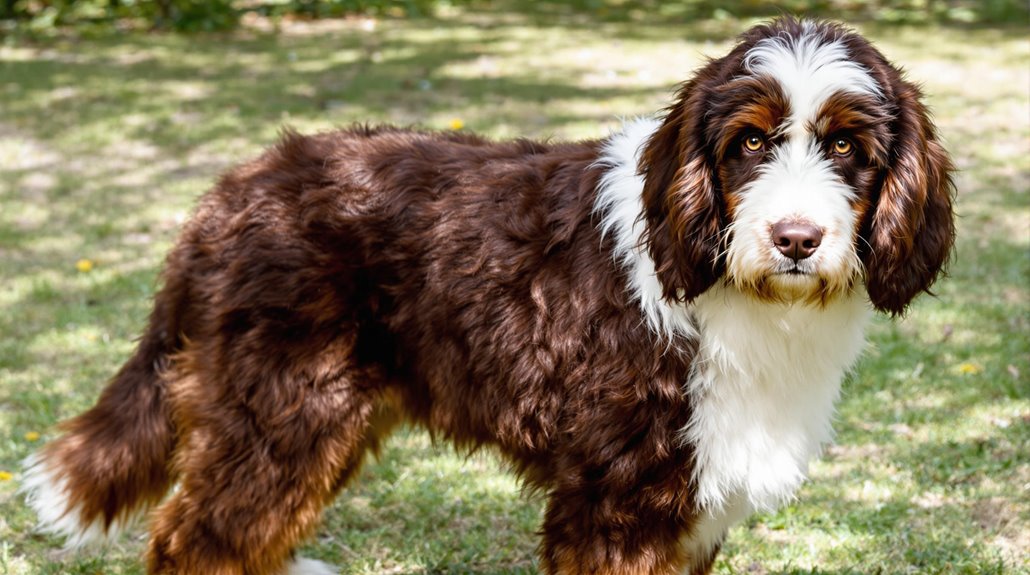
Most Bernedoodles exhibit remarkable physical diversity due to their hybrid genetics, with sizes ranging from tiny to standard varieties. You'll find three distinct size categories: Tiny Bernedoodles measuring 12-17 inches and weighing 10-24 pounds, Miniature Bernedoodles at 18-22 inches and 25-49 pounds, and Standard Bernedoodles reaching 23-29 inches and 70-90 pounds.
When it comes to their coat characteristics, you'll notice three main variations: wavy, curly, and straight. If you're concerned about shedding, you'll want to take into account a Bernedoodle with a curly coat, as they typically shed less than their straight-coated counterparts. Their color patterns are equally diverse, offering you choices including:
- Black Tricolor
- Sable Tricolor
- Phantom
- Bicolor
- Parti Color
- Solid variations (Chocolate and Merle)
You can expect your Bernedoodle to live between 12 and 18 years, with smaller sizes typically enjoying longer lifespans. Many Bernedoodles showcase the beloved tricolor markings inherited from their Bernese Mountain Dog parent, making them instantly recognizable as designer dogs.
Temperament and Personality Traits

Inside every Bernedoodle, you'll find a gentle soul with boundless affection. These remarkable dogs bring warmth and companionship to any home, making them perfect partners for those who want to share their love with others.
The temperament of Bernedoodles stands out for several key qualities:
- Natural Nurturers: They're exceptionally good with children and often work as therapy dogs, providing comfort to those in need.
- Social Butterflies: You'll need to start socialization early to help your Bernedoodle develop positive relationships with people and other pets.
- Smart and Trainable: While they might show occasional stubbornness, they'll respond well when you use positive reinforcement techniques.
- Exercise Partners: Plan for 30-45 minutes of daily activity to keep your Bernedoodle mentally and physically satisfied.
To bring out the best in your Bernedoodle's personality, you'll want to establish consistent training routines and provide plenty of opportunities for social interaction. Their intelligence and willingness to please make them quick learners, though you'll need patience during training sessions. Remember, your dedication to their development will reward you with a well-adjusted, loving companion.
Health and Life Expectancy

Throughout their generally healthy lives, Bernedoodles enjoy a robust lifespan of 12 to 18 years, with smaller varieties often living longer than their larger counterparts. You'll appreciate that these designer dogs typically experience better health outcomes than purebreds, thanks to their hybrid vigor.
When you're considering a Bernedoodle's health and life expectancy, you should be aware of several key factors:
- They inherit fewer genetic health issues compared to their purebred parents
- Regular vet check-ups are essential to monitor for common concerns like hip dysplasia
- Their cancer risk is considerably lower than Bernese Mountain Dogs
- Proper breeding practices greatly impact their overall health
You'll need to watch for specific health conditions that can affect your Bernedoodle:
- Hip and elbow dysplasia
- Eye problems
- Skin sensitivities
- Joint issues
The good news is that responsible breeding practices have helped create a healthier, longer-living companion. By maintaining regular veterinary care and staying alert to potential health concerns, you can help your Bernedoodle reach the upper end of their life expectancy range while enjoying a quality life together.
Training and Exercise Requirements
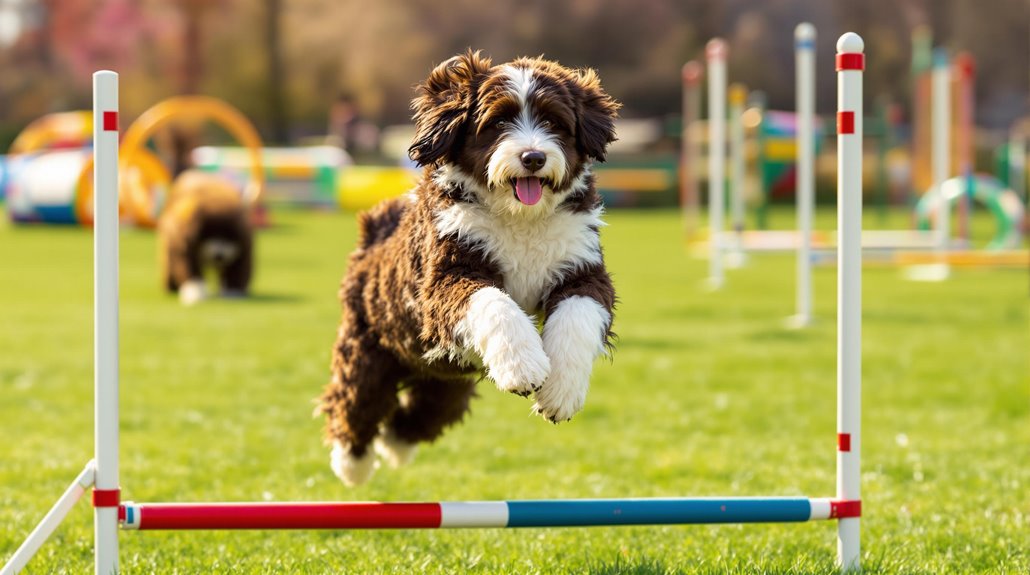
Key Exercise Requirements:
- Daily walks or jogs
- Interactive play sessions
- Backyard activities
- Mental stimulation games
Training Essentials:
- Begin socialization early to develop a confident, well-adjusted adult
- Use positive reinforcement consistently
- Incorporate puzzle toys and training games
- Practice obedience exercises regularly
Your Bernedoodle's intelligence makes them highly trainable, but you'll need to stay consistent with your commands and expectations. While they're quick learners thanks to their Poodle heritage, they can display occasional stubbornness that requires patient guidance.
Remember that exercise isn't just about physical activity – it's also an opportunity to strengthen your bond. Combine training sessions with exercise by practicing commands during walks or incorporating agility exercises. This dual approach guarantees you're meeting both their physical needs and mental stimulation requirements while developing a well-mannered companion.
Grooming and Coat Care
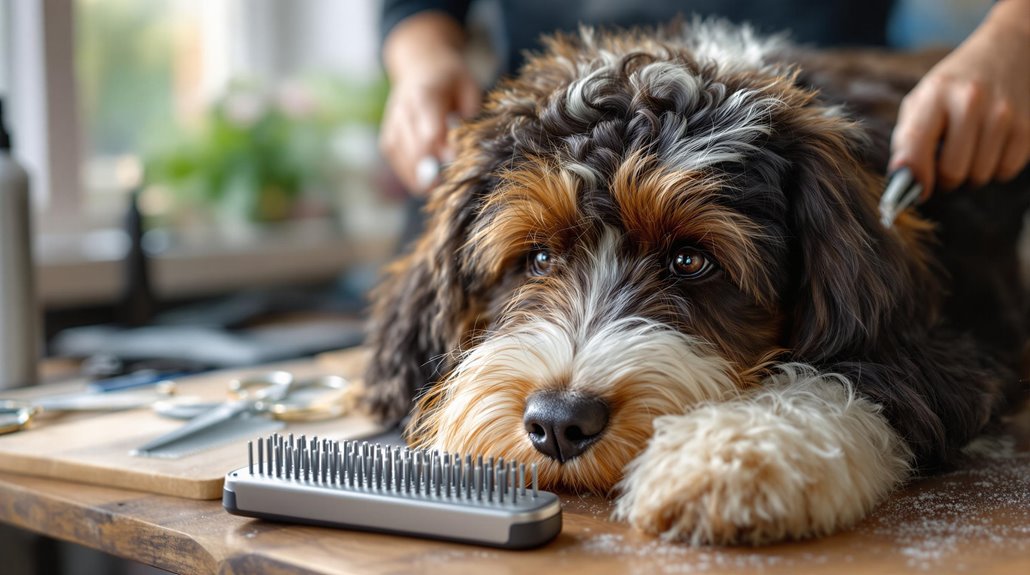
When it comes to grooming, Bernedoodles require dedicated attention to maintain their luxurious coats and overall health. You'll need to establish a regular grooming routine that includes brushing your dog's coat at least twice weekly to prevent matting and tangles.
Professional grooming should be scheduled every 6-8 weeks to keep your Bernedoodle's coat in prime condition. During these sessions, a professional groomer will trim and shape your dog's coat while addressing any maintenance issues that need attention.
Here's what your regular grooming routine should include:
- Brushing sessions 2-3 times per week to maintain coat health
- Bathing every few months or when your dog gets particularly dirty
- Regular ear cleaning to prevent moisture buildup and infections
- Nail trimming as needed to maintain proper paw health
Your commitment to coat care will make a significant difference in your Bernedoodle's comfort and appearance. While the grooming requirements might seem demanding, they're essential for preventing skin issues and maintaining your dog's overall well-being. You'll find that establishing a consistent grooming schedule helps make the process more manageable for both you and your furry friend.
Living With Children and Pets

- Introduce your puppy to different people, children, and pets during their first few months
- Monitor interactions between smaller Bernedoodles and young children to prevent accidental injuries
- Teach children proper handling techniques, such as:
- No pulling on ears or tail
- Gentle petting and appropriate play
- Respecting the dog's space and rest time
When introducing your Bernedoodle to other pets, maintain supervision until they're comfortable with each other. While they typically get along well with other animals, each dog has its own personality. You'll want to:
- Allow gradual introductions in neutral spaces
- Reward positive interactions
- Create separate spaces for each pet when needed
Common Health Concerns

A Bernedoodle's health benefits from hybrid vigor, which typically results in fewer genetic health issues compared to purebred dogs. This mixed breed can live between 12 to 18 years when properly cared for, making them wonderful long-term companions for dedicated owners.
While these dogs generally enjoy good health, you'll need to watch for certain inherited conditions:
- Hip dysplasia and elbow dysplasia, which can affect mobility
- Eye disorders that may require regular monitoring
- Various forms of cancer that can develop later in life
To guarantee your Bernedoodle stays healthy:
- Schedule regular veterinary check-ups for early detection of potential problems
- Keep up with vaccination schedules and parasite prevention
- Monitor your dog's movement for signs of joint issues
- Watch for changes in eye appearance or vision
- Maintain a healthy weight through proper diet and exercise
Remember that prevention is key to managing health concerns. Working closely with your veterinarian will help you develop an appropriate health maintenance plan. While Bernedoodles may face certain health challenges, their mixed breeding often provides them with stronger immune systems and fewer congenital defects than their purebred parents.
Choosing Your Bernedoodle Companion
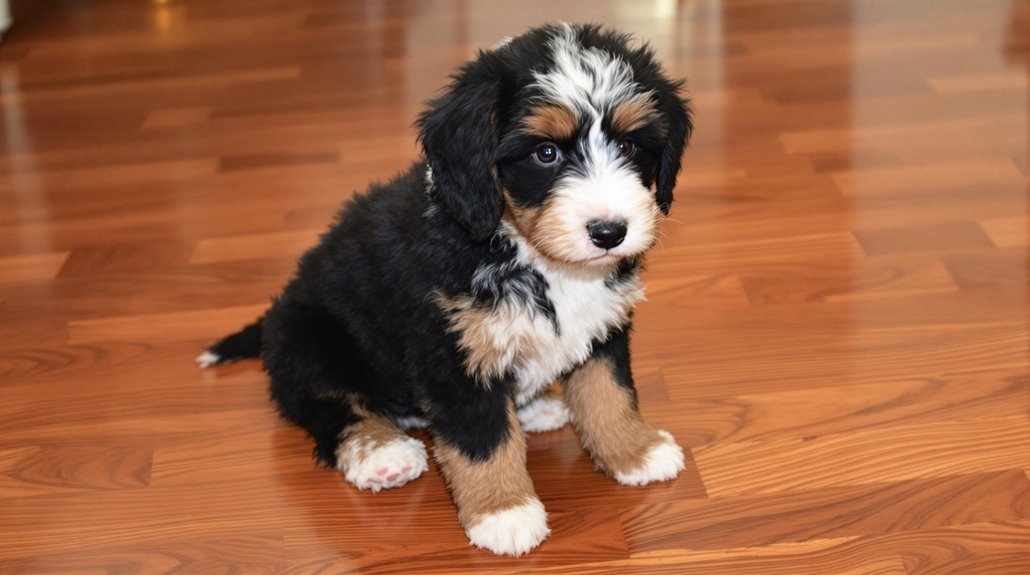
Before bringing a Bernedoodle into your life, you'll need to make several essential decisions about size, generation type, and lifestyle compatibility. Start by determining which size variant fits your living space: Tiny, Miniature, or Standard Bernedoodle.
Your choice between F1 and F1b generations will impact both health and maintenance requirements. F1 Bernedoodles offer genetic diversity, which can reduce inherited health problems, while F1b varieties shed less and are better suited for allergy sufferers.
Consider these key factors when selecting your Bernedoodle:
- Daily exercise commitment of 30-60 minutes
- Space requirements based on size selection
- Time available for training and socialization
- Family dynamics and household activity level
Working with a reputable Bernedoodle breeder is vital for ensuring your puppy's health and temperament. Quality breeders will:
- Provide thorough health testing documentation
- Allow you to meet the parent dogs
- Share detailed information about their breeding practices
- Offer guidance on puppy care and training
Remember that proper socialization in the early months will shape your Bernedoodle's behavior and adaptability, making them an ideal family companion.
Designer Dog Since 2003
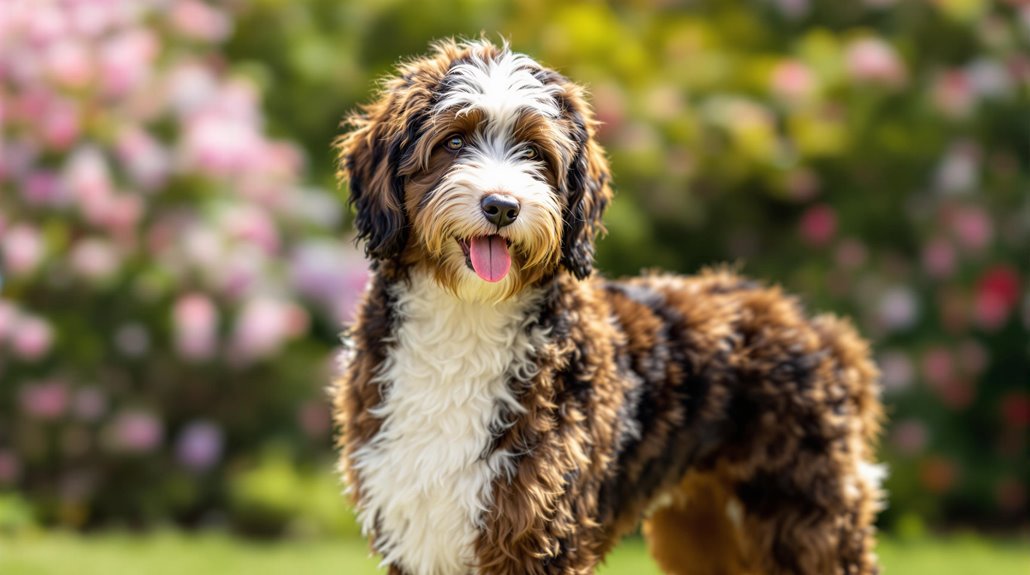
You'll find the Bernedoodle's origin story began in 2003 when Canadian breeder Sherry Rupke first developed this designer breed to create a healthier, hypoallergenic companion dog. The intentional mix of Bernese Mountain Dog and Poodle genetics has led to standardized breeding practices focused on temperament, size variations, and coat types. Since their creation, Bernedoodles have gained widespread recognition among hybrid dog registries and continue to grow in popularity as family pets due to their blend of intelligence and affectionate nature.
Origin By Sherry Rupke
Creating the Bernedoodle breed was the innovative work of Sherry Rupke, who first introduced this designer dog in 2003 from her Ontario, Canada location. As a breeder, she envisioned combining the best qualities of two distinct dog breeds: the Bernese Mountain Dog and the Poodle. Her primary goals focused on developing a companion animal that would offer the benefits of both parent breeds while minimizing their challenges.
Rupke's breeding program emphasized several key objectives:
- Creating a hypoallergenic alternative for families who couldn't own a Bernese Mountain Dog
- Reducing inherited health issues common in purebred Bernese Mountain Dogs
- Developing a dog with exceptional companionship qualities
You'll find that Rupke's approach to breeding Bernedoodles prioritized function over form, concentrating on temperament and health rather than standardized appearance. While the breed isn't recognized by the AKC, it has gained acceptance from various hybrid dog registries. The result of Rupke's careful breeding program is a dog that combines the Bernese Mountain Dog's calm, affectionate nature with the Poodle's intelligence and reduced shedding characteristics.
Growing Popularity Since Creation
- Exceptional blend of intelligence and affection, creating an ideal balance for households seeking both a smart and loving companion
- Hypoallergenic qualities that make them suitable for families with allergies
While you won't commonly find Bernedoodles in shelters, their intentional breeding practices have contributed to their reputation as healthy, well-adjusted pets. The increasing recognition by hybrid dog registries reflects their growing legitimacy in the dog breeding community, even without AKC recognition.
Their popularity continues to grow as more families discover the benefits of this thoughtfully designed cross, combining the best characteristics of both parent breeds.
Intentional Breeding Standards
The Bernedoodle's journey began in 2003 when breeder Sherry Rupke of Ontario, Canada, developed this designer breed by crossing Bernese Mountain Dogs with Poodles. This intentional breeding program focused on creating dogs with exceptional temperaments and fewer health issues than their parent breeds.
Unlike traditional purebreds, Bernedoodle breeding standards prioritize function over appearance. You'll find these standards emphasize:
- Health screening of parent dogs
- Temperament testing to guarantee friendly dispositions
- Careful size selection (Standard, Miniature, or Tiny)
- Maintenance of hypoallergenic coat qualities
While this hybrid breed isn't recognized by the AKC, several designer dog registries support and document Bernedoodle breeding practices. You'll discover that responsible breeders focus on:
- Reducing inherited health problems
- Maintaining genetic diversity
- Preserving desirable traits from both parent breeds
- Matching appropriate sizes for different living situations
The emphasis on intentional breeding has resulted in dogs that typically experience fewer health issues thanks to hybrid vigor. This careful approach to breeding has helped establish Bernedoodles as reliable, healthy companions for families seeking specific traits in their pets.
Designer Canine Crossbreed Phenomenon
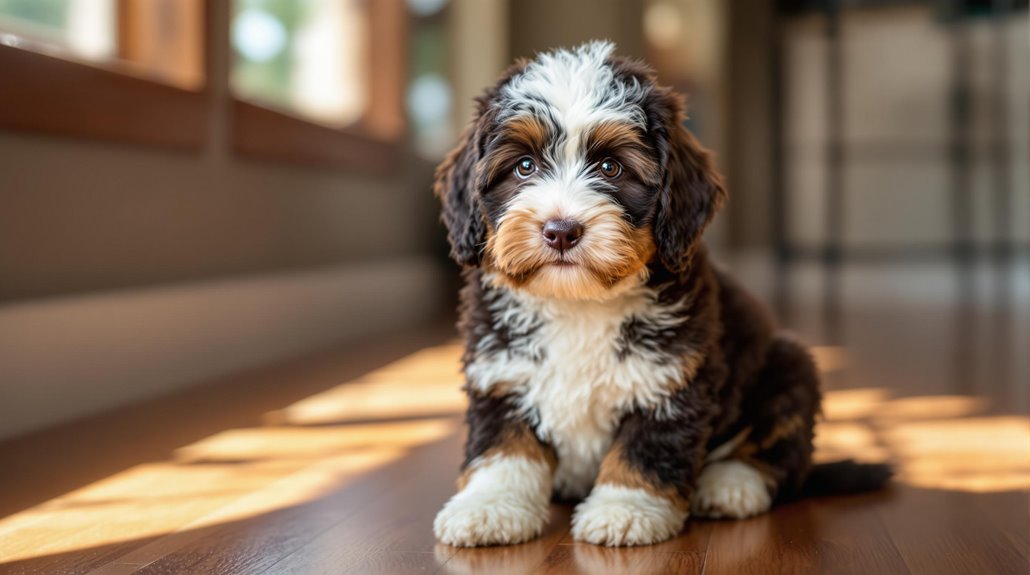
Over the past two decades, designer dog breeds have revolutionized how people choose their ideal pets. The Bernedoodle, created in 2003, exemplifies this trend as a thoughtfully developed designer dog breed that combines the best traits of Bernese Mountain Dogs and Poodles. You'll find that this intentional crossbreeding aims to serve families seeking specific characteristics in their companions.
The rising popularity of Bernedoodles reflects a broader shift in how we approach canine breeding. Here's what makes them stand out in the designer breed movement:
- Customizable sizes to match different living situations
- Low-shedding coats that benefit allergy-sensitive families
- Enhanced health potential through hybrid vigor
- Adaptable temperaments suitable for therapy work
You'll notice that designer breeds like the Bernedoodle offer practical solutions to common pet ownership challenges. Their success has paved the way for other purposeful crossbreeds, demonstrating how selective breeding can create dogs that meet modern lifestyle needs while maintaining health and temperament standards.
This phenomenon has transformed the pet industry, providing options that weren't available to previous generations of dog owners. The Bernedoodle stands as a prime example of how designer breeds can successfully serve diverse family requirements.
Distinctive Tri-Colored Markings

Standing 12-29 inches tall at the shoulder, your Bernedoodle's distinctive wavy-to-curly coat requires consistent maintenance to keep it looking its best. You'll notice their fur has a unique texture that combines the Poodle's curl with the Bernese Mountain Dog's thickness, making regular brushing essential. To prevent matting and maintain their coat's health, you'll need to establish a regular grooming routine that includes thorough brushing at least 2-3 times per week.
Height Ranges 12-29 Inches
Bernedoodles' impressive height range spans from 12 to 29 inches, with three distinct size categories to suit different lifestyles. When you're considering adding a Bernedoodle to your family, understanding these size variations will help you make the right choice for your living situation.
The three size categories break down as follows:
- Tiny Bernedoodles: Standing 12-17 inches tall, they're perfect if you live in an apartment or have limited space. You'll find they adapt well to compact living areas while maintaining their loving nature.
- Miniature Bernedoodles: Measuring 18-22 inches in height, they offer a middle-ground option. You'll appreciate their moderate size if you want a dog that's not too small or too large.
- Standard Bernedoodles: Reaching 23-29 inches at the shoulder, they're the largest variety. You'll notice they closely match the Bernese Mountain Dog's traditional stature.
These height ranges provide flexibility in choosing a Bernedoodle that matches your space requirements and lifestyle needs. Whether you're looking for a compact companion or a full-sized family dog, there's a Bernedoodle size that will fit perfectly into your home.
Wavy to Curly Fur
Beyond their varied sizes, the distinctive coat of a Bernedoodle sets them apart in the designer dog world. Their wavy to curly fur comes with unique characteristics that make them an excellent choice for families seeking a low-shedding companion.
You'll find these dogs showcase beautiful tri-colored markings of black, white, and rust, inherited from their Bernese Mountain Dog parent. It's crucial to recognize that your Bernedoodle's coat may change over time, as many carry a fading gene that can lighten their darker fur as they mature.
When choosing your Bernedoodle, consider that curly coats shed less than wavy ones, making them more suitable if you're managing allergies. However, both coat types require dedicated maintenance to keep them healthy and looking their best.
To maintain your Bernedoodle's coat:
- Brush at least twice weekly to prevent matting
- Pay special attention to areas prone to tangling
- Schedule regular professional grooming sessions
- Monitor coat changes as your dog ages
Your commitment to regular grooming won't just keep your Bernedoodle looking beautiful—it'll help guarantee their coat stays healthy and manageable throughout their life.
Regular Brushing Prevents Matting
A Bernedoodle's stunning tri-colored coat demands regular brushing to maintain its eye-catching appearance and prevent uncomfortable matting. Due to their Poodle heritage, these dogs develop coats that can quickly become tangled without proper care and attention.
You'll need to establish a consistent grooming routine of brushing at least twice weekly, focusing particularly on areas prone to matting. Pay special attention to your Bernedoodle's ears and underbelly, where tangles commonly form. When you maintain regular brushing sessions, you're not just keeping their coat looking beautiful – you're preventing skin irritation and discomfort.
Professional grooming appointments every 6-8 weeks complement your at-home care routine. These sessions help maintain your Bernedoodle's distinctive coat pattern and guarantee thorough mat removal. Your groomer can spot potential issues early and keep the coat at a manageable length.
Key Brushing Guidelines:
- Brush thoroughly twice per week minimum
- Focus on ears and underbelly areas
- Schedule professional grooming every 6-8 weeks
- Use appropriate brushing tools for their coat type
- Address tangles immediately to prevent mat formation
Devoted Family Companion Dog
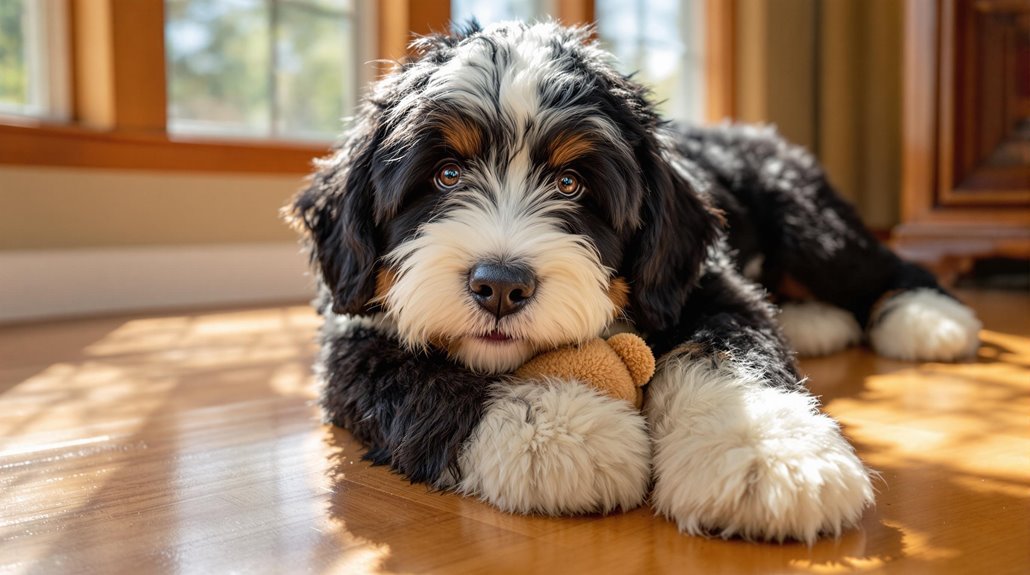
Bernedoodles shine as devoted family companions, using their quick problem-solving abilities to master new commands and adapt to your household routine. You'll find your Bernedoodle's gentle nature makes them especially patient with children, forming strong protective bonds while maintaining a calm demeanor during playtime. Your new furry friend will need 30-45 minutes of daily exercise to stay happy and healthy, which can include walks, fetch sessions, or structured training activities.
Quick Problem-Solving Learners
Combining the intelligence of Poodles with the gentle nature of Bernese Mountain Dogs, your Bernedoodle will impress you with their remarkable problem-solving abilities and willingness to learn.
These quick-thinking dogs excel in various training scenarios, making them ideal companions for families committed to positive reinforcement training. You'll notice their intelligence shine through as they master new commands and adapt to different situations with ease.
To maximize your Bernedoodle's cognitive potential:
- Provide 30-45 minutes of daily exercise to keep their mind and body engaged
- Incorporate puzzle toys and training games into their routine
- Start socialization early to develop well-rounded behavior
- Use consistent training methods to build on their natural learning abilities
Your Bernedoodle's problem-solving skills will become evident in how they:
- Navigate new environments confidently
- Learn household routines quickly
- Respond to complex commands
- Adapt their behavior around children and other pets
With proper guidance, you'll find that your Bernedoodle's intelligence makes them highly trainable and capable of serving various roles, from family companion to therapy dog, always enthusiastic to please and quick to understand your expectations.
Gentle With Young Siblings
While their intelligence makes them exceptional learners, your Bernedoodle's most endearing trait shines through in their interactions with children. These gentle giants have earned a reputation as devoted family companions, often serving as therapy dogs due to their naturally calm and patient demeanor.
You'll find that your Bernedoodle's affectionate nature creates a perfect environment for young siblings to grow and play safely. To maximize these positive interactions, you'll want to:
- Dedicate 30-45 minutes daily to structured exercise and playtime between your Bernedoodle and children
- Start socialization early to reinforce gentle behaviors and proper interaction skills
- Supervise initial interactions to guarantee both your dog and children learn appropriate boundaries
- Create opportunities for bonding through shared activities
Your Bernedoodle's inherent gentleness, combined with proper training, will help establish a strong foundation for lasting relationships within your family. They'll naturally adjust their play style to match your children's energy levels, making them ideal playmates for kids of all ages. This adaptability, paired with their patient nature, guarantees your Bernedoodle will become a trusted companion for your growing family.
0-Minute Daily Exercise Needed
Active families will find the perfect match in a Bernedoodle's exercise requirements, which demand 30-45 minutes of daily physical activity. You'll need to maintain a consistent routine to keep your furry companion both physically fit and mentally stimulated.
To meet your Bernedoodle's activity level needs, you can:
- Take them on brisk walks around the neighborhood
- Play interactive games like fetch in your backyard
- Engage in agility training sessions
- Include family members in exercise activities
You'll notice that regular exercise does more than just burn energy – it helps prevent unwanted behaviors that can develop from boredom. When you establish an exercise routine early, you're setting your Bernedoodle up for success by:
- Strengthening your bond through shared activities
- Developing proper socialization skills
- Preventing stubborn or anxious tendencies
- Maintaining their gentle, affectionate nature
Remember that your Bernedoodle's exercise shouldn't be solitary – they thrive on family involvement. Make their daily physical activity a family affair, and you'll satisfy both their exercise requirements and their need for companionship simultaneously.
Joint Health Screening Essential

Your Bernedoodle's joint health directly impacts their quality of life throughout their 2-15 year lifespan, making regular screening for hip and elbow dysplasia essential. You'll need to schedule routine veterinary wellness visits to catch any early signs of joint issues, which are particularly common in this breed. Since joint problems can develop at any age, your vet can help create a preventive care plan that includes appropriate screening intervals and early intervention strategies.
Hip and Elbow Dysplasia
Joint health screening plays a critical role in maintaining your Bernedoodle's quality of life, particularly when it comes to hip and elbow dysplasia. As a mix between Bernese Mountain Dogs and Poodles, your pet inherits genetic predispositions to these conditions from both parent breeds, making regular monitoring essential.
You'll need to watch for specific signs that may indicate joint problems:
- Limping or favoring certain legs
- Difficulty getting up from a lying position
- Reluctance to exercise or play
- Struggling with stairs or jumping
To protect your Bernedoodle's joint health, you should:
- Schedule regular X-ray screenings
- Maintain a healthy weight through proper diet
- Provide appropriate exercise without overexertion
- Consult your veterinarian at the first sign of mobility issues
Early detection through health screenings can make a significant difference in managing these conditions. When you work with responsible breeders who prioritize joint health in their breeding programs, you're taking an important step toward ensuring your Bernedoodle's long-term mobility and comfort. Remember, prevention and proactive care are your best tools for supporting your pet's joint health.
2-15 Years Average Lifespan
Bernedoodles' impressive lifespan of 12 to 18 years hinges considerably on proactive joint health monitoring, especially during their first five years of life. You'll need to establish a strong foundation for their long-term wellbeing through regular health screenings and proper care during these vital early years.
Key Joint Health Milestones in First 5 Years:
- Years 1-2: Initial joint health screenings to detect early signs of hip or elbow dysplasia
- Years 2-3: Regular weight management to prevent excess stress on developing joints
- Years 3-5: Ongoing mobility assessments and exercise adjustments
Your Bernedoodle's genetic makeup as a hybrid breed offers some natural protection against health issues, but don't let this advantage make you complacent about joint health monitoring. You'll want to:
- Schedule regular veterinary check-ups
- Maintain appropriate exercise levels
- Monitor weight consistently
- Address any mobility changes promptly
Remember that smaller Bernedoodles typically enjoy longer lifespans, but all sizes benefit from early joint health intervention. By focusing on joint health during these first five years, you're investing in your dog's potential to reach the upper end of their life expectancy range.
Regular Veterinary Wellness Visits
Professional veterinary check-ups form the cornerstone of maintaining those impressive Bernedoodle lifespans. As a responsible owner, you'll need to prioritize joint health screenings, which are particularly essential due to inherited conditions from the Bernese Mountain Dog parent.
Your veterinarian will perform thorough physical examinations during these wellness visits, often including X-rays to assess your dog's hip and elbow joints. You'll want to schedule these screenings at least annually, with more frequent visits if your Bernedoodle shows signs of mobility issues or discomfort.
Key components of wellness visits include:
- Extensive joint health evaluations
- Weight management discussions
- Exercise recommendations
- Early detection of potential joint problems
- Preventive care strategies
You can support your dog's joint health between visits by:
- Maintaining proper weight through diet control
- Following exercise guidelines
- Monitoring mobility changes
- Providing appropriate supplements (as recommended by your vet)
Monthly Professional Grooming Needed
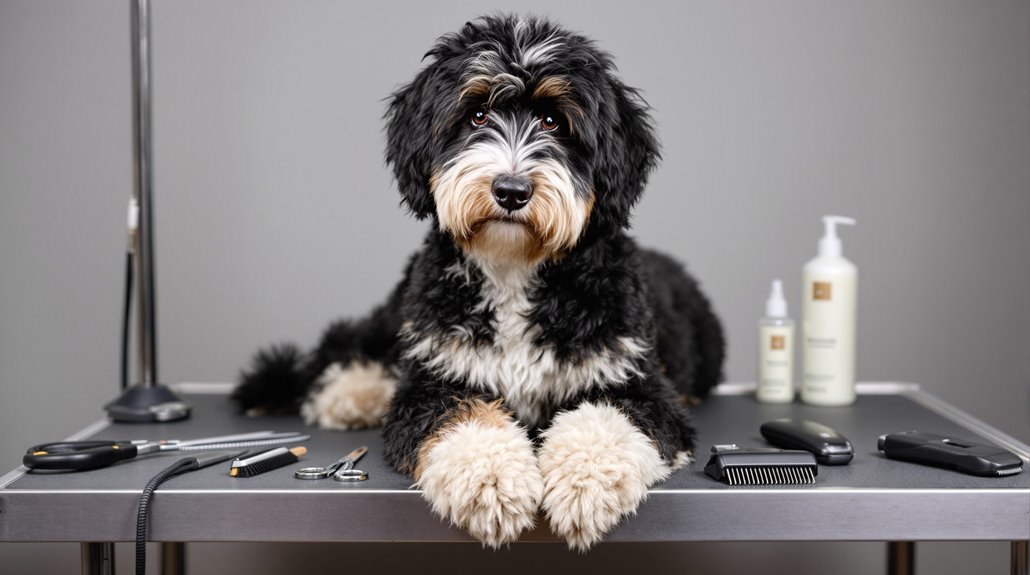
Keeping your Bernedoodle looking their best requires regular visits to a professional groomer every 6-8 weeks. Their unique coat, inherited from their Poodle parentage, needs specialized care to prevent matting and maintain its healthy appearance. Professional grooming isn't just about aesthetics; it's essential for your dog's overall well-being and comfort.
Your Bernedoodle's grooming needs will depend on their specific coat type, with curlier coats demanding more frequent attention. During these sessions, groomers provide extensive care that includes:
- Professional coat trimming and styling to manage length and prevent tangling
- Thorough ear cleaning and nail trimming for ideal hygiene
- Specialized brushing techniques that help control shedding and reduce allergens in your home
When budgeting for your Bernedoodle's care, plan to spend between $50 and $100 per grooming session. The exact cost will vary based on your dog's size and coat condition. While this might seem like a significant investment, regular grooming prevents more costly issues that can arise from neglected coat care and helps maintain your dog's health and happiness.
Premium Puppy Purchase Price
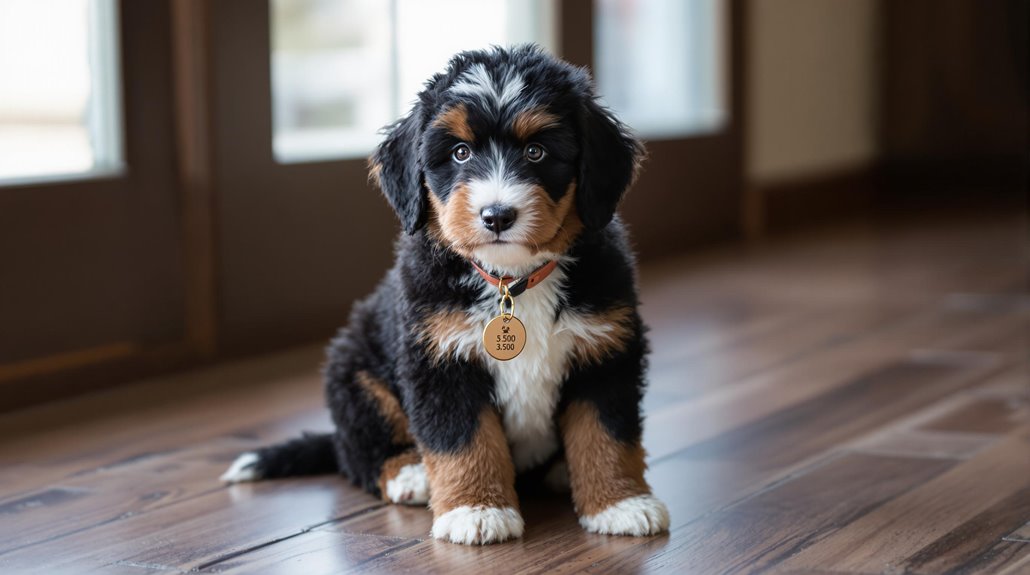
Beyond regular grooming expenses, the initial investment in a Bernedoodle puppy represents one of your largest costs as a potential owner. When purchasing from a reputable dog breeder, you'll find prices typically ranging from $2,000 to $5,000.
| Type | Price Range |
|---|---|
| F1 Standard | $3,000-4,500 |
| F1 Mini | $3,500-5,000 |
| F1 Toy | $4,000-5,000 |
| Tri-colored | $3,500-5,000 |
| Rare Colors | $4,000-5,000 |
The cost variation depends on several key factors that influence your Bernedoodle puppy's value. F1 Bernedoodles, being first-generation crosses, often command higher prices due to their hybrid vigor and reduced health concerns. You'll notice that mini and toy varieties typically cost more than standard sizes, reflecting their increased breeding complexity and market demand.
When evaluating prices, consider that reputable breeders include thorough health testing, initial vaccinations, and early socialization in their fees. These essential services guarantee you're bringing home a healthy, well-adjusted puppy. Unique coat patterns, particularly tri-colored or rare color combinations, can add to the premium price point of your new companion.
Health-Tested Parent Verification

Confidence in your Bernedoodle's genetic health starts with verified parent testing. When you're researching breeders, health-tested parent verification should be a top priority to guarantee your future companion's well-being.
Responsible breeders conduct thorough health screenings on both the Bernese Mountain Dog and Poodle parents before breeding. These tests specifically target conditions like hip and elbow dysplasia, common eye disorders, and other inherited health issues that can affect both breeds.
Look for these key verification elements from your breeder:
- Official certifications from the Orthopedic Foundation for Animals (OFA)
- Documentation from the Canine Eye Registry Foundation (CERF)
- Complete genetic testing results for both parent breeds
- Written health clearances for hereditary conditions
Allergy-Friendly Dog Guide
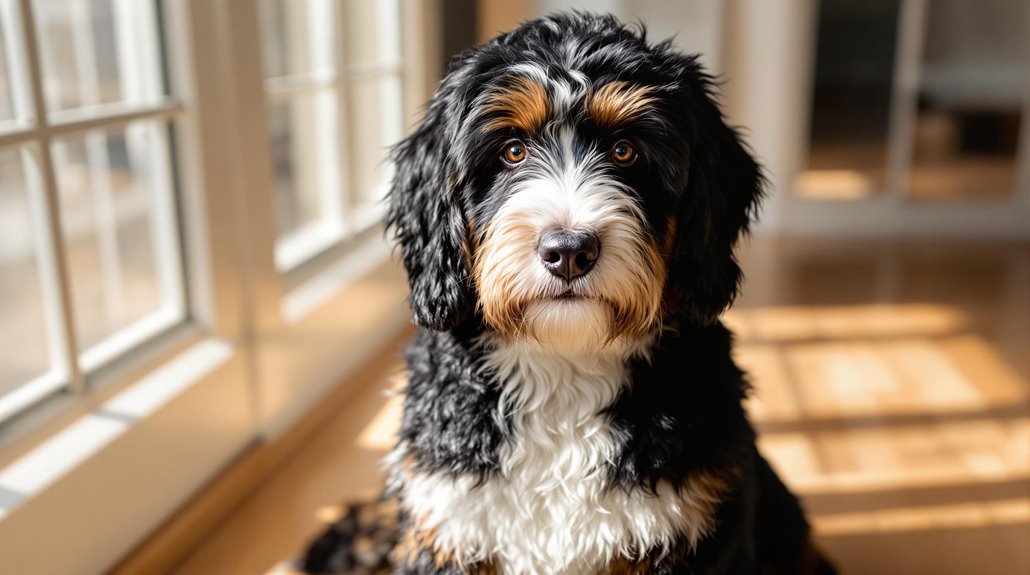
Key Allergy-Friendly Features:
- Coat Types: Curly-coated Bernedoodles typically shed less than their wavy or straight-coated counterparts
- Allergen Reduction: Regular grooming removes loose hair and dander, greatly decreasing allergens in your home
- Maintenance Requirements: Daily brushing and scheduled bathing help maintain the coat's allergy-friendly properties
While no dog is completely hypoallergenic, you'll find that Bernedoodles produce fewer allergens compared to many other breeds. To maximize their allergy-friendly benefits:
- Establish a consistent grooming routine
- Keep your home clean and well-ventilated
- Start early socialization to develop a calm temperament
- Consider professional grooming every 6-8 weeks
Remember that individual reactions can vary, so it's recommended to spend time with a Bernedoodle before making your decision. With proper care and maintenance, these loving companions can provide a comfortable solution for allergy-conscious families.
Frequently Asked Questions
What Is the Downside of Bernedoodles?
You'll face several key challenges with a Bernedoodle. Their intensive grooming needs require frequent professional care and daily brushing to prevent matting. You'll need to address potential health concerns like hip dysplasia and eye problems, which can be costly. Training challenges may arise from their stubborn streak, while their high exercise requirements demand 30-45 minutes of daily activity. They don't do well alone, so you'll need to guarantee they get plenty of companionship.
What Are the Behavior Issues With Bernedoodles?
"You can't teach an old dog new tricks," but with Bernedoodles, you'll want to start early. You'll face several behavior challenges, including:
- Stubbornness during training sessions, requiring your consistent patience
- Separation anxiety when you're away too long
- Destructive behaviors if they're not mentally and physically stimulated
- Wariness of strangers without proper socialization
- Excessive barking due to protective instincts
These issues aren't insurmountable – they just need your dedicated training and loving guidance.
What Does F2B Bernedoodle Mean?
The F2B classification refers to a specific breeding generation of Bernedoodle that you'll get by breeding an F1 Bernedoodle (50% Bernese/50% Poodle) with a purebred Poodle. This creates a dog that's 75% Poodle and 25% Bernese Mountain Dog. You'll find that F2B Bernedoodles typically have more predictable traits, especially in their coat type and shedding patterns, making them a popular choice for families seeking a more allergy-friendly dog.
What Is the Temperament of a Bernese Poodle Mix?
Like a loyal friend who's always ready for both cuddles and adventure, your Bernedoodle will bring a perfect blend of personalities to your home. You'll find they're incredibly loving and gentle, inheriting the Bernese's devotion and the Poodle's intelligence. They'll need consistent exercise to stay happy, and early socialization is key to their development. You can expect a highly trainable companion who'll thrive with positive reinforcement and regular mental stimulation.
Conclusion
You'll find the Bernedoodle offers everything you're looking for in a family companion – intelligence from the Poodle, gentleness from the Bernese, and loyalty from both parents. While they require dedicated grooming and come with a premium price tag, their hypoallergenic coats, adaptable personalities, and health-tested lineage make them worth considering. Whether you choose tiny, medium, or standard size, you're investing in a devoted friend who'll bring joy and companionship for years to come.
